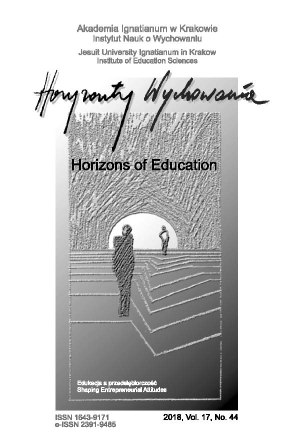Mobilność edukacyjna przejawem motywów przedsiębiorczych w doświadczeniach właścicielek niepublicznych placówek edukacyjnych
Educational Mobility in Context of the Entrepreneurship Intentions in Experiences of Women-Owners of Non-Public Kindergarten
Author(s): Jolanta SajderaSubject(s): Business Economy / Management, Socio-Economic Research, Sociology of Education
Published by: Uniwersytet Ignatianum w Krakowie
Keywords: women’s entrepreneurship; women’s education; Polish non-public educational institution; marketization of education
Summary/Abstract: RESEARCH OBJECTIVE: The paper focuses upon the subjective aspect of entrepreneurship in the context of marketization of education in Poland. The aim of the article is to draw attention to the sources of entrepreneurial intentions related to the experiences of women-owners of nonpublic educational institutions. THE RESEARCH PROBLEM AND METHODS: The aim is to present and analyse educational decisions of the owners’ before their intention to establish a private educational institution. Experience resulting from educational biographies constitutes the subject of the research and for that reason the research procedure uses the qualitative approach. The source of data are narrative interviews conducted with the owners of 18 non-public educational institutions for pre-school children (kindergarten) operating in Krakow. THE PROCESS OF ARGUMENTATION: The first part refers to the theoretical assumptions concerning the research on relations between women’s entrepreneurship and their education. In the second one, attention is paid to the entrepreneurial activity of self-employed women-owners within the Education (section PKD) and next the results of own research is reported and discussed. RESEARCH RESULTS: The results of the narrative analysis show the directions of educational and horizontal mobility of women-owners of non-public educational institutions, as well as differences in giving meaning to the further improvement of entrepreneurial or pedagogical competences. CONCLUSIONS, INNOVATIONS, AND RECOMMENDATIONS: Women’s entrepreneurship research rarely includes owners of non-public educational institutions. Understanding the motives of activities of this professional group allows reflection on entrepreneurial activities in the field of marketization of education. It is also important with regard to the quality of the educational offer for children created by them.
Journal: Horyzonty Wychowania
- Issue Year: 17/2018
- Issue No: 44
- Page Range: 145-154
- Page Count: 10
- Language: Polish

